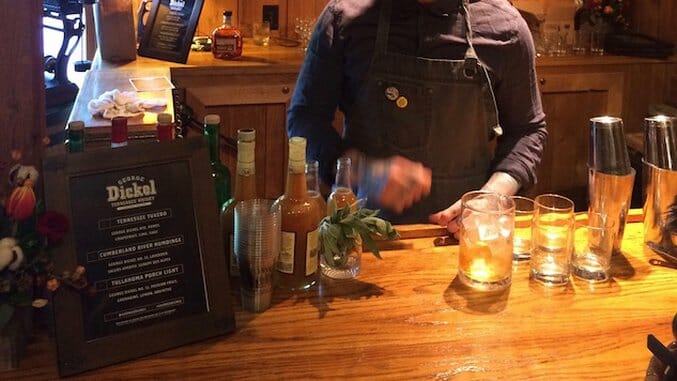George Dickel: Overlooked and Under-Appreciated
Photos by Jonah Flicker
George Dickel Tennessee Whisky’s (trademarked) slogan is “Handmade the hard way,” and you’ll hear this often when you visit the distillery (from here on out, I’ll be using the American spelling, “whiskey,” but Dickel does use “whisky” on its label). Master distiller Allisa Henley is fond of repeating the phrase. And, as in so many marketing devices in the whiskey industry, it’s true and it’s not true. Compared to that other Tennessee whiskey, the juggernaut that is Jack Daniel’s, Dickel does indeed feel like a smaller, more hands-on operation. But Dickel is owned by the gargantuan spirits conglomerate Diageo, and it sources its rye from MGP over in Indiana – a detail that irks some people, the same wrongheaded snobs who won’t drink excellent non-distiller produced liquid from the likes of Michter’s and Bulleit. It seems that, at least outside of Tennessee, Dickel is often overlooked. This might change as the distillery continues to expand and has just released an older expression that can hang with the likes of Blade and Bow 22, IW Harper 15, and Wild Turkey 17.
I recently had the opportunity to visit the Cascade Hollow distillery on a press trip sponsored by Dickel. After cavorting in Nashville for a bit, checking out some honky-tonks, and trying some Hattie B’s hot chicken (next time, Prince’s, I promise), I headed down to tour the distillery’s bucolic grounds and check out the warehouses with Henley. But first, a little bit about what makes Tennessee whiskey unique. According to federal law, Tennessee whiskey must be made in the state of Tennessee, unlike bourbon, which can be made anywhere. On a state regulatory level, like bourbon the mash bill for Tennessee whiskey must be at least 51% corn. In addition, it must undergo the Lincoln County process, which means that the new make whiskey is filtered through about 10 feet of sugar maple charcoal, which is supposed to “mellow” the whiskey’s flavor.
-

-

-

-

-

-

-

-

-

-

-

-

-

-

-

-

-

-

-

-

-

-

-

-

-

-

-

-

-

-

-

-

-

-

-

-

-

-

-

-









































